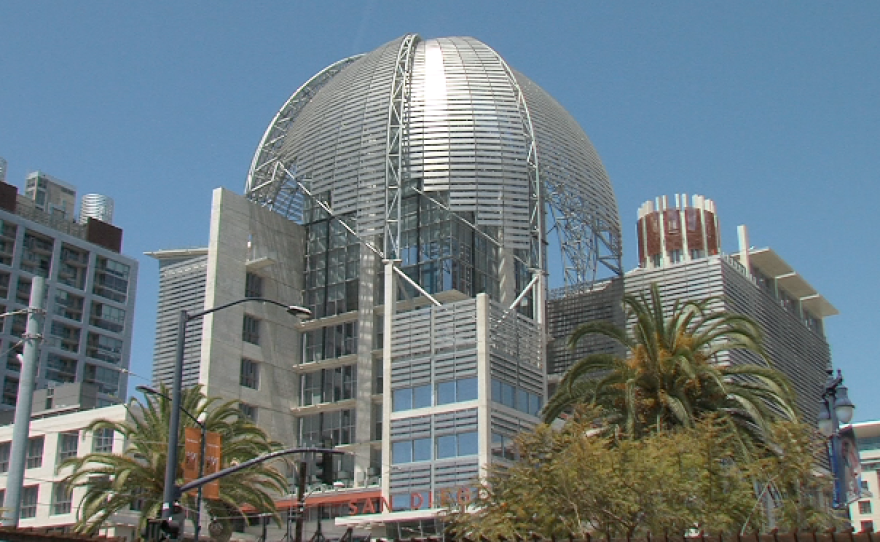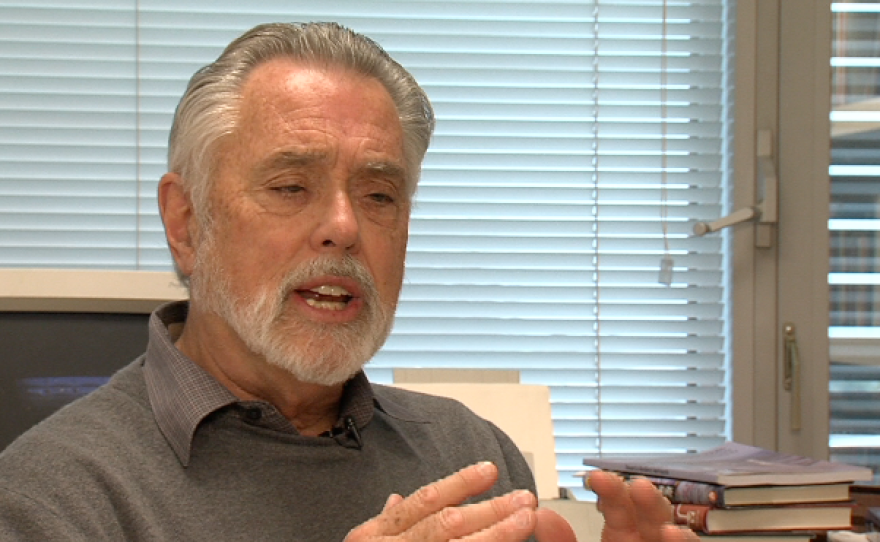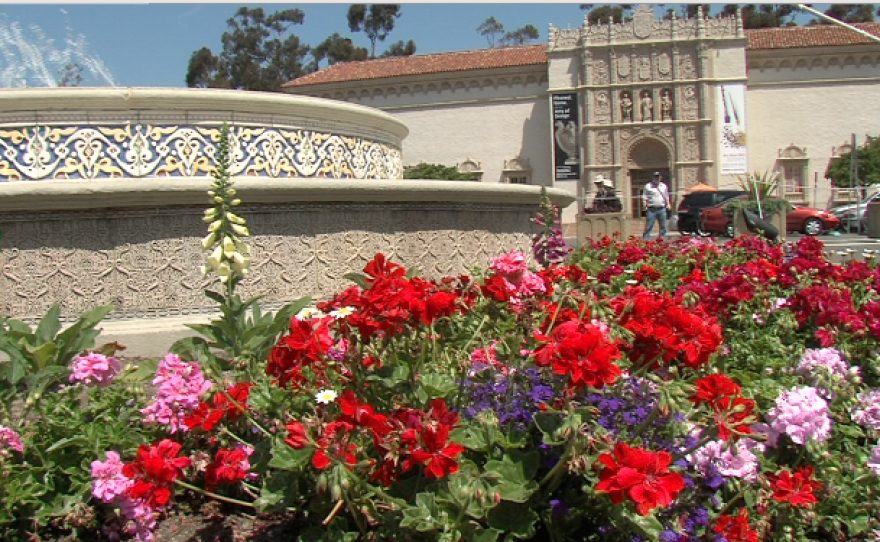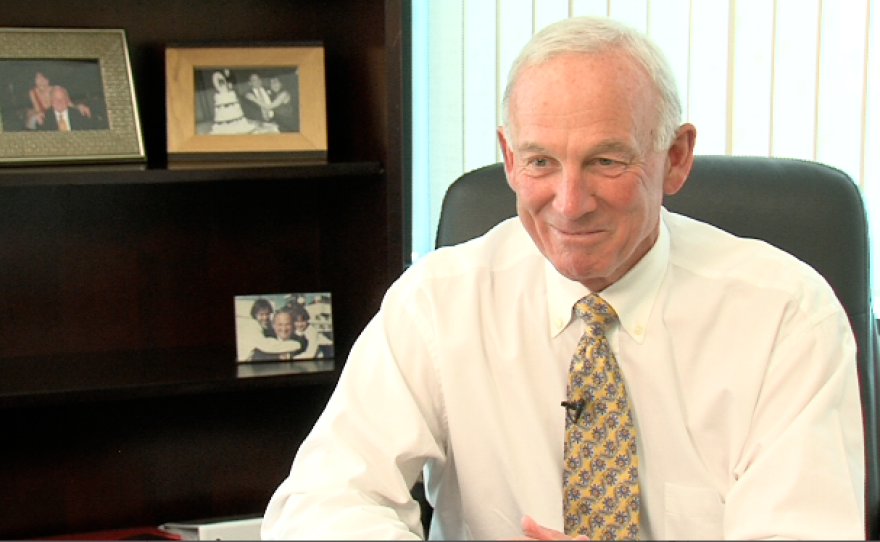Although he's three weeks into his new job, former Mayor Jerry Sanders sits in an office that's still almost empty. His bookshelves are blank aside from a few framed family photos and a stack of business cards showing his new title as president and CEO of the San Diego Regional Chamber of Commerce. His walls are bare. Framed plaques, including one showing his police badges, sit on the floor.
After leaving the mayor's office, Sanders took a long vacation to Italy. While there, he didn't pay much attention to San Diego news.
“You know, my wife didn’t let me read the newspaper while I was in Italy,” Sanders said.
But she made an exception. She told him about a court ruling blocking the Plaza de Panama project, which would have removed cars from the center of Balboa Park. Sanders pushed strongly for the plan, so the news was upsetting.
“I think that's very unfortunate," he said during an interview this week. "I think we had somebody who was willing to step up and pay for the entire project to clear probably the ugliest parking lot in San Diego out and create a grand meeting space. But obviously in San Diego, lawsuits are a part of life.”
A part of life indeed. Plaza de Panama isn’t the only project facing legal challenges.
Several of Sanders' undertakings, including the Convention Center expansion, a balanced budget and pension reform, have been mired in court battles or otherwise diminished. No one is saying all, or even any, of these hangups are Sanders' fault. But the question remains whether the stalls tarnish Sanders' mayoral legacy.

First, a quick review of his biggest projects.
- The new downtown library is scheduled to be complete in July.
- Plaza de Panama, not so much. A memo from the city attorney says the project could be revived, but Sanders said Irwin Jacobs, the plan’s financial backer, likely won’t be involved. “I really think it's a dead issue right now. I think that you can't expect somebody who's willing to donate $30 million to just leave that money hanging there,” Sanders said. Current Mayor Bob Filner also just announced his own plans for changing the traffic patterns in the center of the park.
- The Convention Center expansion downtown is also facing legal hurdles, although a bigger challenge from labor unions was dropped. Labor's support is expected to help the project as it seeks California Coastal Commission approval. The expansion also needs to survive appeals to a court ruling saying a hotel room tax used to pay for the project is legal.
- Then there’s pension reform. Sanders helped set up a two-tier pension system that reduces pension benefits for new city employees. But voter-approved Proposition B is hung up in court.
Sanders said he views his biggest accomplishment as balancing the city’s budget.
“I think the primary reason I got involved was to fix the finances of the city and I feel good about the way that was taken care of,” Sanders said.
Last year, he declared "the city's decades-long structural budget deficit is history." But the city's Independent Budget Analyst later released a report projecting deficits over the next several years.

Steve Erie, a political professor at UC San Diego, leaned back in his chair in his cramped office and reminisced about Sanders' tenure.
Behind him was a floor-to-ceiling bookshelf filled with books, and a few copies of "Paradise Plundered," Erie's own written history of San Diego, sat on his desk. Erie called the idea of a balanced San Diego budget "a mirage," something that seems close, but that gets farther away as you move toward it.
“We had a false rumor last year from Mayor Sanders that the budget was balanced and there was going to be a surplus going five years out," he said. "Well, that balanced budget lasted for about a month and a half.”
Payments to the pension system and money owed for infrastructure repairs prevent the budget from being truly balanced, Erie said.
"There are still a few holes in the budget that really occurred under Jerry's watch that make it harder for Mayor Filner and his successors to solve that problem of the mirage in the desert," he said.
Still, Erie said Sanders should be given credit.
“There's a lot to be said for a mayor who stepped in during the throes of a fiscal crisis. There were scandals, mayors had resigned, somebody had to put a steady hand on the ship of state," he said. "And I think Jerry accomplished that.”
But even if all Sanders’ projects succeed, Erie does not see them as signs of a great mayor. That’s because they all focus on one part of San Diego: Downtown.
“Jerry Sanders was a great, great, mayor for Downtown," he said. "He was not so great a mayor for the neighborhoods. In fact, you see it if you look at the declining quality of public services, parks, libraries, potholes, public safety. And you take a picture in 2005 when he was elected mayor and you take a picture today and what you see is a decline.”
Carl Luna, a visiting political professor at University of San Diego, stopped while on his way to class one busy afternoon to talk about San Diego mayors. Sanders was like many mayors in his focus on downtown, Luna said.
“City Hall is Downtown. The lobbyists for the business interests are Downtown. The convention industry is Downtown," he said. "And so if you're out in Normal Heights, if you're up in Mira Mesa, you don't get a whole lot of love from 202 C Street.”
But Sanders points out he improved roads and other infrastructure throughout San Diego. And, he said, focusing on Downtown is good for the rest of the city.
“Downtown is an economic generator for the city and it's where a lot of jobs are created and a lot of economic value in terms of returns on property tax, in terms of sales tax, tourism tax," he said. "So you're always keeping an eye on Downtown and working on issues there to create the revenue stream for the rest of San Diego, and that's one of the things we worked on.”
But Luna sees another reason for this so-called “edifice complex”: San Diego mayors don’t usually move on to higher offices.

“So what you do here in your time in office is probably how you're going to be remembered,” he said.
Sanders laughed at the thought of running for office again. He’s definitely done.
"You know I'm probably not a very good politician, I think I proved that on several issues," he said. "I think I came in at a time where I felt the city needed a different type of leadership and brought a lot of people around us. It was a community-wide effort to do the types of things we needed to do, but politics is not something that interests me into the future."
Last week, he did some more traveling on a Chamber trip to Mexico City. There, he talked with Mexican leaders about border region issues and business. He also spent some time with Filner. Sanders said he understands the reasons Filner has picked so many battles in his first months in office.
“In those first six months, there's always going to be tests," he said. "The council's going to be testing him, he's going to be testing everybody to see what power he has, and I don't think it always looks as good to the public as the fact that you're just trying to figure out where you're going, and I think that's what Bob's trying to figure out.
"And we have very different styles. I don't think that's a surprise to anybody. Bob's style is his and mine is mine and neither of us are probably going to change since we're both a little bit older. So I think people knew what his style was when they elected him, and that's what they actually wanted to see."
One of those battles was Filner's refusal to sign an agreement with the Tourism Marketing District, which had been worked out under Sanders' administration. Sanders said there was no way he could have signed the agreement before leaving office.
“It was a matter of it not being available to sign," he said. "I signed the resolution the second that it came to my desk, and if you go back in the chronology, that was the Tuesday before the Monday that I was out of office. I was able to sign that on the Thursday as soon as it came out of the City Clerk's office. But the actual contract was not available at that point to sign. It was still in contracts and there were legal issues with it, so that was something I didn't have the power to sign at that point.”
He hopes to work with Filner on promoting small business and fixing up roads. In his new role at the Chamber, he will focus on lending staff to help consult on infrastructure issues and helping small businesses thrive by setting up targeted training programs.
Sanders also isn’t worried about his mayoral legacy, or whether the projects he undertook end up succeeding.
“You can only do what you can when you're in office, and when you leave, it's up to somebody else," he said. "And I don't feel bad about that. People voted for term limits and said that we want changes in leadership from time to time and I certainly respect that. And I think it's a healthy thing.”






